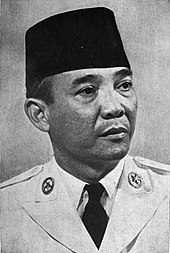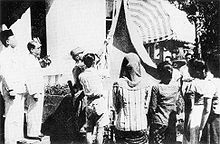Pro-democracy movement
In 1996 Suharto undertook efforts to pre-empt a challenge to the New Order government. The Indonesian Democratic Party (PDI), a legal party that had traditionally propped up the regime had changed direction, and began to assert its independence. Suharto fostered a split over the leadership of PDI, backing a co-opted faction loyal to deputy speaker of the People's Representative Council Suryadi against a faction loyal to Megawati Sukarnoputri, the daughter of Sukarno and the PDI's chairperson.After the Suryadi faction announced a party congress to sack Megawati would be held in Medan on June 20–22, Megawati proclaimed that her supporters would hold demonstrations in protest. The Suryadi faction went through with its sacking of Megawati, and the demonstrations manifested themselves throughout Indonesia. This led to several confrontations on the streets between protesters and security forces, and recriminations over the violence. The protests culminated in the military allowing Megawati's supporters to take over PDI headquarters in Jakarta, with a pledge of no further demonstrations.
Suharto allowed the occupation of PDI headquarters to go on for almost a month, as attentions were also on Jakarta due to a set of high-profile ASEAN meetings scheduled to take place there. Capitalizing on this, Megawati supporters organized "democracy forums" with several speakers at the site. On July 26, officers of the military, Suryadi, and Suharto openly aired their disgust with the forums.[61]
On July 27, police, soldiers, and persons claiming to be Suryadi supporters stormed the headquarters. Several Megawati supporters were killed, and over two-hundred arrested and tried under the Anti-Subversion and Hate-Spreading laws. The day would become known as "Black Saturday" and mark the beginning of a renewed crackdown by the New Order government against supporters of democracy, now called the "Reformasi" or Reformation.[62]
Economic crisis and Suharto's resignation
In 1997 and 1998, Indonesia was the country hardest hit by the East Asian Financial Crisis,[63] which had dire consequences for the Indonesian economy and society, and Suharto's presidency. At the same time, the country suffered a severe drought and some of the largest forest fires in history burned in Kalimantan and Sumatra. The rupiah, the Indonesian currency, took a sharp dive in value. Suharto came under scrutiny from international lending institutions, chiefly the World Bank, International Monetary Fund (IMF) and the United States, over longtime embezzlement of funds and some protectionist policies. In December, Suharto's government signed a letter of intent to the IMF, pledging to enact austerity measures, including cuts to public services and removal of subsidies, in return for receiving the aid of the IMF and other donors. Prices for goods such as kerosene and rice, and fees for public services including education rose dramatically. The effects were exacerbated by widespread corruption. The austerity measures approved by Suharto had started to erode domestic confidence with the New Order[64] and led to popular protests.Suharto stood for re-election by parliament for the seventh time in March 1998, justifying it on the grounds of the necessity of his leadership during the crisis. The parliament approved a new term. This sparked protests and riots throughout the country, now termed the Indonesian 1998 Revolution. Dissent within the ranks of his own Golkar party and the military finally weakened Suharto, and on May 21 he stood down from power.[65] He was replaced by his deputy Jusuf Habibie.
President Habibie quickly assembled a cabinet. One of its main tasks was to re-establish International Monetary Fund and donor community support for an economic stabilization program. He moved quickly to release political prisoners and lift some controls on freedom of speech and association. Elections for the national, provincial, and sub-provincial parliaments were held on June 7, 1999. For the national parliament, Indonesian Democratic Party-Struggle (PDI-P, led by Sukarno's daughter Megawati Sukarnoputri) won 34% of the vote; Golkar (Suharto's party; formerly the only legal party of government) 22%; United Development Party (PPP, led by Hamzah Haz) 12%; and National Awakening Party (PKB, led by Abdurrahman Wahid) 10%.
Politics since 1999
In October 1999, the People's Consultative Assembly (MPR), which consists of the 500-member Parliament plus 200 appointed members, elected Abdurrahman Wahid, commonly referred to as "Gus Dur" as President, and Megawati Sukarnoputri as Vice President, for 5-year terms. Wahid named his first Cabinet in early November 1999 and a reshuffled, second Cabinet in August 2000. President Wahid's government continued to pursue democratization and to encourage renewed economic growth under challenging conditions. In addition to continuing economic malaise, his government faced regional, interethnic, and interreligious conflict, particularly in Aceh, the Maluku Islands, and Irian Jaya. In West Timor, the problems of displaced East Timorese and violence by pro-Indonesian East Timorese militias caused considerable humanitarian and social problems. An increasingly assertive Parliament frequently challenged President Wahid's policies and prerogatives, contributing to a lively and sometimes rancorous national political debate.During the People's Consultative Assembly's first annual session in August 2000, President Wahid gave an account of his government's performance. On January 29, 2001 thousands of student protesters stormed parliament grounds and demanded that President Abdurrahman Wahid resign due to alleged involvement in corruption scandals. Under pressure from the Assembly to improve management and coordination within the government, he issued a presidential decree giving Vice President Megawati control over the day-to-day administration of government. Soon after, Megawati Sukarnoputri assumed the presidency on July 23. In 2004, Susilo Bambang Yudhoyono won Indonesia's first direct Presidential election and in 2009 he was elected to a second term.











